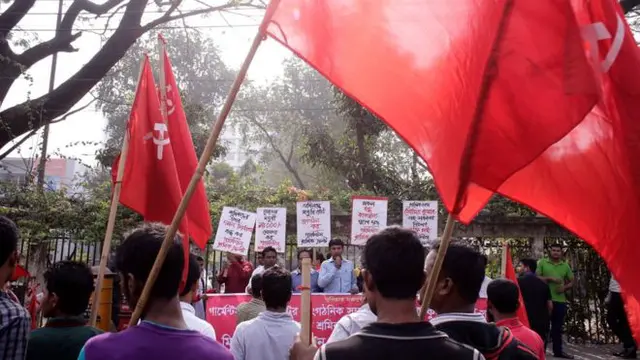At least 1,500 garment workers in Bangladesh have been sacked after a week of protests over pay, say police.
Dozens of factories supplying major Western brands were forced to close after a mass walkout and subsequent demonstrations in the Ashulia district.
Police said factories opened on Tuesday with many now back at work, but they also detained several labour leaders.
Last week, police arrested a journalist well known for his coverage of the garment industry for" inciting unrest".
Nazmul Huda stands accused of incorrect reporting and holding secret meetings with union leaders - a charge that has been denied by at least one of his employers.
He was the first journalist to report on problems with the structure of the Rana Plaza complex, just a day before it collapsed in 2013, killing more than 1,100 people.
The collapse of the building sparked global outrage and put the spotlight on working conditions, low wages and safety standards in a garment sector that manufactured clothes for some major global brands.
Garment manufacturing makes up the vast majority of Bangladesh's exports and any interruption is likely to have an impact on the economy.
It was the sacking of a 121 workers that prompted the initial walkout of workers more than a week ago. Their protest soon expanded to demand a monthly minimum wage of 16,000 taka. It is currently 5,300 taka.
But factories nevertheless resumed operations on Tuesday and that was when hundreds discovered they had lost their jobs, reports say. Union chiefs said police used a controversial law to shut down the protests.
Ashulia is a vast garment production hub used by clothing companies around the world, including Western giants like Zara, GAP and H&M.
(BBC)
 简体中文
简体中文

